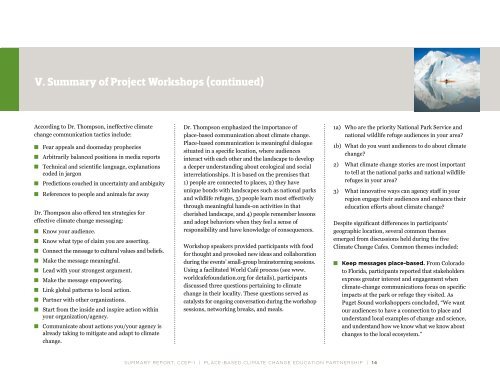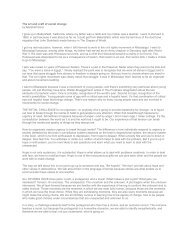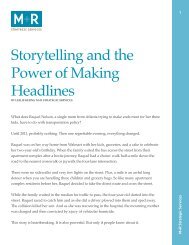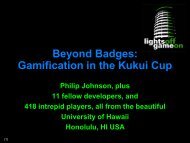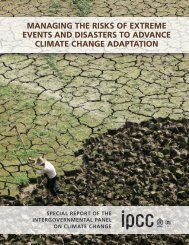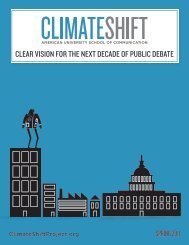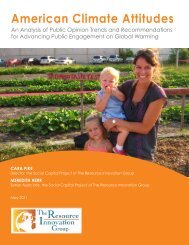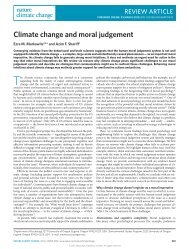Place-based Climate Change Education Partnership Report.pdf
Place-based Climate Change Education Partnership Report.pdf
Place-based Climate Change Education Partnership Report.pdf
Create successful ePaper yourself
Turn your PDF publications into a flip-book with our unique Google optimized e-Paper software.
V. Summary of Project Workshops (continued)<br />
According to Dr. Thompson, ineffective climate<br />
change communication tactics include:<br />
Fear appeals and doomsday prophecies<br />
Arbitrarily balanced positions in media reports<br />
Technical and scientific language, explanations<br />
coded in jargon<br />
Predictions couched in uncertainty and ambiguity<br />
References to people and animals far away<br />
Dr. Thompson also offered ten strategies for<br />
effective climate change messaging:<br />
Know your audience.<br />
Know what type of claim you are asserting.<br />
Connect the message to cultural values and beliefs.<br />
Make the message meaningful.<br />
Lead with your strongest argument.<br />
Make the message empowering.<br />
Link global patterns to local action.<br />
Partner with other organizations.<br />
Start from the inside and inspire action within<br />
your organization/agency.<br />
Communicate about actions you/your agency is<br />
already taking to mitigate and adapt to climate<br />
change.<br />
Dr. Thompson emphasized the importance of<br />
place-<strong>based</strong> communication about climate change.<br />
<strong>Place</strong>-<strong>based</strong> communication is meaningful dialogue<br />
situated in a specific location, where audiences<br />
interact with each other and the landscape to develop<br />
a deeper understanding about ecological and social<br />
interrelationships. It is <strong>based</strong> on the premises that<br />
1) people are connected to places, 2) they have<br />
unique bonds with landscapes such as national parks<br />
and wildlife refuges, 3) people learn most effectively<br />
through meaningful hands-on activities in that<br />
cherished landscape, and 4) people remember lessons<br />
and adopt behaviors when they feel a sense of<br />
responsibility and have knowledge of consequences.<br />
Workshop speakers provided participants with food<br />
for thought and provoked new ideas and collaboration<br />
during the events’ small-group brainstorming sessions.<br />
Using a facilitated World Café process (see www.<br />
worldcafefoundation.org for details), participants<br />
discussed three questions pertaining to climate<br />
change in their locality. These questions served as<br />
catalysts for ongoing conversation during the workshop<br />
sessions, networking breaks, and meals.<br />
1a) Who are the priority National Park Service and<br />
national wildlife refuge audiences in your area?<br />
1b) What do you want audiences to do about climate<br />
change?<br />
2) What climate change stories are most important<br />
to tell at the national parks and national wildlife<br />
refuges in your area?<br />
3) What innovative ways can agency staff in your<br />
region engage their audiences and enhance their<br />
education efforts about climate change?<br />
Despite significant differences in participants’<br />
geographic location, several common themes<br />
emerged from discussions held during the five<br />
<strong>Climate</strong> <strong>Change</strong> Cafes. Common themes included:<br />
<br />
From Colorado<br />
to Florida, participants reported that stakeholders<br />
express greater interest and engagement when<br />
climate-change communications focus on specific<br />
impacts at the park or refuge they visited. As<br />
Puget Sound workshoppers concluded, “We want<br />
our audiences to have a connection to place and<br />
understand local examples of change and science,<br />
and understand how we know what we know about<br />
changes to the local ecosystem.”


